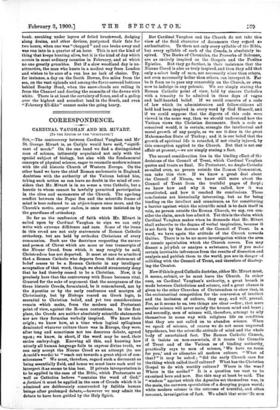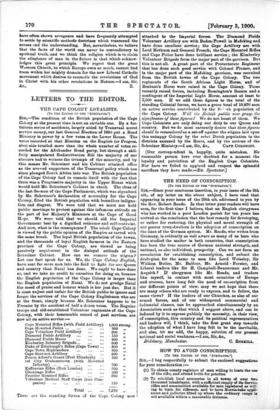CORRESPONDENCE.
CARDINAL VAUGHAN AND MR. MIVART. [To Tax EDITOR OP TRE "SPECTATOR."] SIR,—The controversy between Cardinal Vaughan and Mr' St. George Mivart is, as Carlyle would have said, "signifi- cant of much." On the one hand we find a distinguished man of science, intimately acquainted not only with the special subject of biology, but also with the fundamental concepts of physical science, eager to reconcile modern'acience with the old historic Church of Western Europe. On the other hand we have the chief Roman ecclesiastic in England, doubtless with the authority of the Vatican behind him, taking such action as can leave no doubt in the mind of out- siders that Mr. Mivart is in no sense a true Catholic, but a heretic to whom cannot be lawfully permitted participation in the rites and sacraments of the Church. The age-long conflict between the Papal See and the scientific frame of mind is here reduced to an object-lesson once more, and the Church's motto, server cadent, is once more insisted on by the guardians of orthodoxy.
So far as the confession of faith which Mr. Mivart is called upon by Cardinal Vaughan to sign we can only write with extreme diffidence and care. Some of the items in this creed are not only statements of Roman Catholic orthodoxy, but are held by orthodox Christians of every communion. Such are the doctrines respecting the nature and person of Christ which are more or less transcripts of the Nicene Creed, from which, it may roughly be said, Christendom has not departed. It must at once be admitted that a Roman Catholic who departs from that statement of belief ceases to be a Roman Catholic in any intelligent acceptation of that word, though we should strenuously deny that he had thereby ceased to be a Christian. Now, it is precisely here that the controversy with Rome becomes vital. Granted for the sake of argument that the acceptance of the three historic Creeds, formulated, be it remembered, not by the Apostles or by the early confessors and martyrs of Christianity, but by Bishops reared on Greek logic, is essential to Christian belief, and yet two considerations remain which make, from the modern and Protestant point of view, against the Roman contentions. In the first place, the Creeds are neither absolutely scientific statements nor are they formulas verbally inspired. We know their origin; we know how, at a time when logical syllogisms dominated whatever culture there was in Europe, they were, after long and sometimes not too decorous debate, agreed upon; we know, in short, if the word may be used, their entire embryology. Knowing all this, and knowing how utterly all human language fails to express divine truth, we can only accept the Nicene Creed as an attempt (to use Arnold's words) to "reach out towards a great object of con- sciousness." We must, therefore, regard such a document as being essentially fluid, and hence we must leave each soul to interpret it as seems to him best. If private interpretation is to be applied in the case of the Bible, which Protestants as well as Catholics believe "contains the word of God," a fortiori it must be applied in the case of Creeds which it is admitted are deliberately constructed by fallible human beings after prolonged debate,—however we may admit the debate to have been guided by the Holy Spirit. But Cardinal Vaughan and the Church do not take this view of the fluid character of documents they regard as authoritative. To them not only every syllable of the Bible, but every syllable of each of the Creeds, is absolutely in- spired. The Books of Chronicles, the Proverbs of Solomon, are as entirely inspired as the Gospels and the Pauline Epistles. But they go further, in their insistence that the Nicene Creed is also as truly inspired, and then they add that only a select body of men, not necessarily wiser than others, not even necessarily holier than others, can interpret it. Far be it from us to pass any censorship on the Church, or even now to indulge in any polemic. We are simply stating the Roman Catholic point of view, held by sincere Catholics with a tenacity to be admired in these days of vague and half-hearted belief. If we could conceive of a code of law which its administrators and fellow-citizens all held had been inspired in every word by God Himself, and if we could suppose that the digests of this code were viewed in the same way, then we should understand how the Vatican views the Christian documents. Such a code so conceived would, it is certain, strangle the intellectual and moral growth of any people, as we see it does in the great Mahommedan State of Turkey; and it is our belief that the growth of spiritual life is retarded, if not vitally injured, by this conception applied to the Church. But that is not our affair at present,—we are simply stating a fact.
The second consideration lies in the binding effect of the decisions of the Council of Trent, which Cardinal Vaughan quotes and treats as final. No Protestant, no Anglo-Catholic so-called even, no person outside the Roman Communion, can take this view. If we know a great deal about the Council of Nicaea, we know still more about the Council of Trent from the truthful pages of Sarpi ; we know how and why it was called, how it was constituted, and how it reached its conclusions. Those conclusions are historically interesting, but as for being binding on the intellect and conscience, as for constituting a barrier against which the scientific mind is to dash itself in vain, no person outside the Roman Church, we say, can con- sider the claim, much less admit it. Yet this is the claim which Cardinal Vaughan makes when he demands that Mr. Mivart shall subscribe to the dogma of verbal inspiration, because it is set forth by the decrees of the Council of Trent. In a word, we have again the attitude of the Church towards Galileo. There is to be no more investigation within the area of cosmic speculation which the Church covers. You may dissect a jellyfish or analyse a substance, but if you make certain inevitable inferences from the results of dissection and analysis and publish them to the world, you are in danger of colliding with the Council of Trent, and therefore of disobey- ing the Creator.
Now if this is good Catholic doctrine, either Mr. Mivart must, it seems, submit, or he must leave the Church. In either case, on Cardinal Vaughan's authority, a great breach is made between Catholicism and science, and a great chance is given to the other Churches of Christendom to show that, in the ecclesiastical competition for the conversion of intellect and the inclusion of culture, they may, and will, prevail. For, as it seems to us, two things are clear :—firsr, that mere secular science will never satisfy the human mind and heart ; and secondly, men of science will, therefore, attempt to ally themselves in some way with religions life on condition that they are not called on to abandon science. When we speak of science, of course we do not mean unproved hypotheses, but the scientific attitude of mind and the whole body of ascertained fact. The Roman Catholic Church, if it insists on non-essentials, if it treats the Councils of Trent and of the Vatican as of binding authority, practically says to men of science, We have no room for you,' and so alienates all modern culture. " What of that?" it may be asked ; "did the early Church care for the thing which called itself culture? What has the Christian Gospel to do with worldly culture P Where is the wise? Where is the scribe?" It is a question too vast to be examined here and now. But this may at least be said. The " wisdom " against which the Apostles set themselves was, in the main, the outworn speculation of a decaying pagan world; while modern science is the outcome of truthful, and often reverent, investigation of fact. We admit that scienr:fic men
have often shown arrogance and have frequently attempted to settle by scientific methods doctrines which transcend the senses and the understanding. Bat, nevertheless, we believe that the facts of the world can never be contradictory to spiritual truth, and we think the religion which is to claim the allegiance of man in the future is that which acknow- ledges this great principle. We regret that the great Western Church, to which Europe owes so much, cannot find room within her mighty domain for the new Liberal Catholic movement which desires to reconcile the revelations of God in Christ with his other revelations in Nature.—I am, Sir,







































 Previous page
Previous page